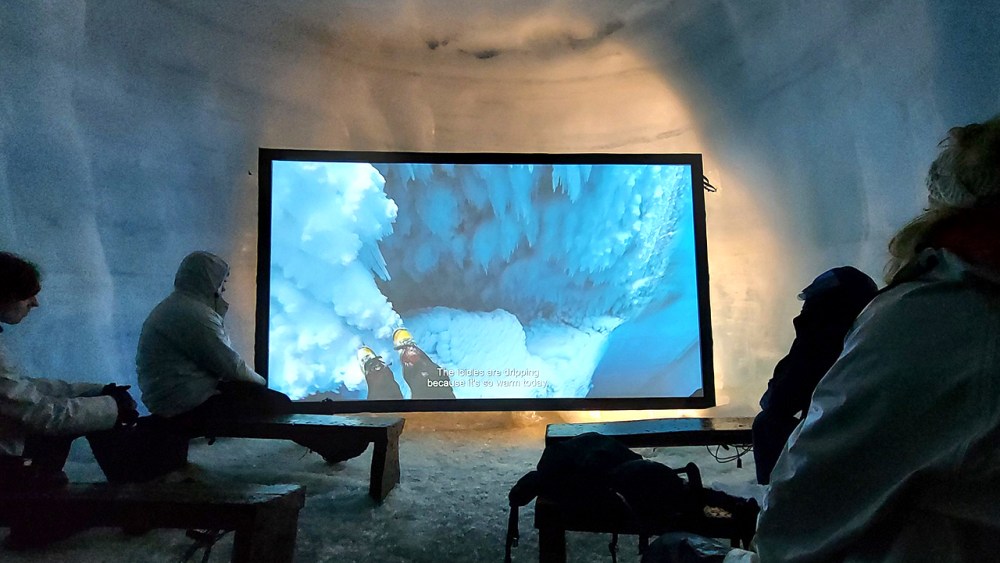Reykjavik Film Festival Carves Out Distinctive Icelandic Identity
A post-metal band plays at a screening of a vintage Viking saga. Björk shows up to check out the latest films by Pedro Almodovar and Athina Rachel Tsingari. Filmmakers relax in warm mineral-laden waters at the ocean’s edge. Industry members are invited to the President of Iceland’s house to chat about the state of the film business. It’s a typical day at the Reykjavik International Film Festival.
But Iceland isn’t just hot springs and Vikings — well-situated between Europe and North America, the country is booming as a shooting destination. RIFF provides a key place for filmmakers to network and learn more about the production scene in the small country with the big production incentives.
“The festival is a very good place for people to meet,” says RIFF director Hrönn Marinósdóttir. “The Icelandic industry is really growing. I think we have a new generation of really talented filmmakers that are really well received in the biggest festivals, like in Venice this year.”

The band Solsatir performs at a screening of Viking epic “When the Raven Flies.”
Held in early October when temperatures are still moderate and it stays light past 7 p.m., the festival has a distinctly Icelandic flavor. Each year, director Marinósdóttir and her team program events that might include swim-in screenings in one of the city’s many warm public pools, cinematic culinary experiences and music-themed programming like this year’s concert from metal band Sòlstafir at the retrospective of “When the Raven Flies,” a popular 1984 Viking adventure. Most screenings take place at the Haskolabio building at University of Iceland, which includes five auditoriums and a bar and lounge where festivalgoers congregate.
“We try to do strange things, we have swim-ins, drive-ins, an ice cave cinema, just to appeal to different kinds of people,” Marinósdóttir says.
Marinósdóttir has run the festival since she started it as a university project 21 years ago. “In the beginning, it was very small — 17 films devoted to Icelanders living abroad, Canadians with Icelandic ancestry for example,” she explains.
“There were many challenges with finding the budget, and also politics because I’m not a filmmaker. Some filmmakers in Iceland were surprised that suddenly a journalist, a woman, started an event like this,” Marinósdóttir recalls.
This year’s event included master classes and retrospectives with special guests Nastassja Kinski, Bong Joon-Ho, Swedish music video and feature director Jonas Akerlund and Greek filmmaker Tsingari. A screening of the 2003 animated Daft Punk movie “Interstella 5555” featured some of the filmmakers in attendance.
The Industry Days section hosted discussions like an AI masterclass, a workshop on wardrobe and makeup, a panel on the future of the industry, and a works-in-progress screening. Industry members were also invited to a roundtable discussion with Iceland’s president Halla Tómasdóttir. At the president’s residence, Björk, perhaps the country’s most well-known figure, along with Tsingari, Akerlund, and others, discussed the importance of preserving community spaces like record shops and independent cinemas — both to support artists, engage young people, and help battle the loneliness epidemic.
Industry Days participants also bonded at a field trip to the stunning Hvammsvik Hot Springs and a visit to Thorufoss waterfall, a key filming site for “Game of Thrones.”
Head of programming Frederic Boyer, who also serves as artistic director of Tribeca Festival and Les Arcs in France, says bringing filmmakers to the festival draws an enthusiastic response. “We have a great audience that loves music, that loves Bong Joon Ho, that loves Daft Punk, and that is ready to absorb,” Boyer says. After the screening of Tsingari’s “Harvest,” filmgoers were so engaged, Boyer says, that they asked questions for a full hour.

“A New Kind of Wilderness”
Courtesy of A5 Film
This year’s winning films included the Golden Puffin award for Japanese film “Super Happy Forever” by Kohei Igarashi, which the jury called “delicate and luminous.”
The Different Tomorrow award, given to films that facilitate societal discussion and illuminate solutions to local and global problems, went to the documentary “A New Kind of Wilderness,” by Silje Evensmo Jacobsen, a visually rich study of a nature-loving British-Norwegian family adjusting to a new life.
The Reykjavik International Film Festival ran Sept. 26 to Oct. 6.


